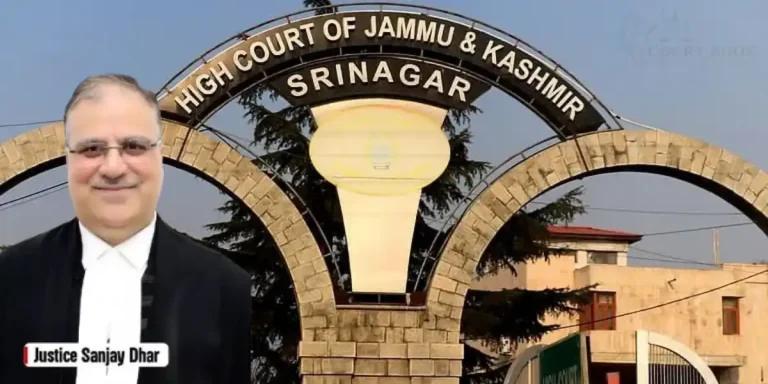The Jammu & Kashmir and Ladakh High Court recently clarified that an order issuing notice in legal proceedings is interlocutory in nature and therefore not open to revisional jurisdiction under Section 438(2) of the Bharatiya Nagarik Suraksha Sanhita (BNSS).
The ruling came from Justice Sanjay Dhar, who dismissed a petition under Section 528 of the BNSS, challenging two previous orders — one from the Chief Judicial Magistrate (CJM), Srinagar, and the other from the 3rd Additional Sessions Judge, Srinagar.
Read Also:- Sending Divorce Draft Is Not Abetment of Suicide: Kerala High Court Clears Husband of Charges
The petition, filed by Aamina and others, stemmed from a case under the Protection of Women from Domestic Violence Act. In that case, the trial magistrate had already granted key reliefs: restraining the respondents from evicting the petitioners from their shared household, committing domestic violence, and had also directed monthly maintenance payments of ₹8,000 for the first petitioner and ₹5,000 each for the others.
Later, the petitioners sought execution of the magistrate’s orders, alongside an interim application requesting the court to stop the respondents from selling or transferring their property. On this application, the magistrate simply issued a notice to the respondents for a hearing.
Read also:- Delhi High Court Summons YouTuber Ajeet Bharti in ₹2.1 Crore Defamation Suit by TFI Media
Disagreeing with the mere issuance of notice, the petitioners filed a revision petition before the 3rd Additional Sessions Judge. However, the revisional court dismissed the petition, stating that the order was interlocutory and therefore not maintainable under the BNSS provisions.
“An order issuing notice on an application does not decide the rights of the parties, therefore, such an order is interlocutory in nature,”
— Justice Sanjay Dhar, J&K High Court
Read Also:- Supreme Court quashes criminal proceedings in Canara Bank fraud case after settling charges
Justice Dhar further clarified that interlocutory orders are designed to handle procedural matters and do not conclusively determine any legal rights. Hence, they fall outside the scope of revisional review as per the BNSS.
“Such orders are passed by a Court to manage the proceedings without finally determining the rights of the parties,”
— Justice Sanjay Dhar observed
Read Also:- Karnataka High Court Orders Re-examination for KPCL Recruitment Due to Lack of Clarity on Negative Marking
Highlighting the legal position, the Court cited Section 438(2) of BNSS, which bars revisional jurisdiction over interlocutory orders. The High Court noted that the revisional court correctly applied this principle, thereby refusing to entertain the petition.
“Sub-section (2) of Section 438 of BNSS creates a statutory bar for exercising revisional powers in relation to any interlocutory order,”
— J&K High Court emphasized
The Court concluded that the revisional court's dismissal of the petition did not require interference under Section 528 of BNSS, and thus, the petition was dismissed as meritless.
“The order impugned passed by learned revisional court, therefore, does not call for any interference by this Court in exercise of powers under Section 528 of BNSS. The petition lacks merit and is dismissed accordingly.”
— Justice Sanjay Dhar, J&K High Court
Case Title: Aamina & Ors. Vs Aamir Ahmad Mir & Ors.













